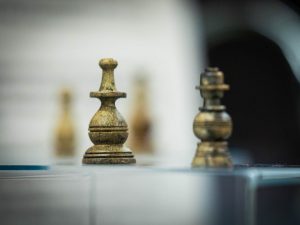 More than 60 Chess pieces carved from wood and bone during the 17th century have been found during excavations at Berezovo in norhtern Siberia. Eight fashioned from fossil ivory were exhibited at the most recent Women’s World Chess Championship.
More than 60 Chess pieces carved from wood and bone during the 17th century have been found during excavations at Berezovo in norhtern Siberia. Eight fashioned from fossil ivory were exhibited at the most recent Women’s World Chess Championship.
Archaeologists excavating a pottery workshop in Israel dating back 1,800 years found that the facility had recreational facilities for workers, including a spa and game room. Inside the game room were four game boards similar to Backgammon or Mancala.
A dot pattern carved in to a 4,000 year-old rock shelter in Azerbaijan was determined to be an example of a game known as 58 Holes, or Hounds and Jackals, another precursor to Backgammon. Previously found examples of the game from that period were limited to Mesopotamia, Egypt, and the Near-East.
Professor Manuel Eisner, with the Violence Research Centre at the University of Cambridge, studied 700 year-old coroner’s records to produce a map of murders in 14th century London. Among his discoveries:
Like in modern societies, homicide was most likely at weekends. Almost a third of all cases (44) occurred on Sundays. Sunday was the day when people had the time to engage in social activities – drinking and playing games that would occasionally trigger frictions leading to assault.
For example:
- In March 1301, an argument that resulted when three men interrupted a Chequers game being played by two others, ended with one of the interrupting men forcibly stripping one of the players of his clothes and stabbing the other in the chest with a dagger.
- In November 1321, two men got in to an argument playing the dice game Hazard inside a brewery. Outside after the game, one attacked the other with a sword then ran away and took refuge in a church. Sometime in the following week he escaped and was never caught by authorities.
- In December 1323, a tavern-keeper was stabbed by a customer that he had beaten in a game of Backgammon.

- Comments Off on Gamer Archaeology
2018 Scoreboard
01 Jan
Posted by David Miller as CCGs, Classic Board Games, Electronic Games, Modern Board Games, Other
 A group of senior high school students at the American British Academy in Muscat set a new record for computer processor built from dominoes. With 15,000 dominoes, they constructed a 5-bit adder that can sum numbers up to 63. [For a fascinating explanation of how this works, I suggest this video from the person who built the 4-bit adder.]
A group of senior high school students at the American British Academy in Muscat set a new record for computer processor built from dominoes. With 15,000 dominoes, they constructed a 5-bit adder that can sum numbers up to 63. [For a fascinating explanation of how this works, I suggest this video from the person who built the 4-bit adder.]
Keisuke Fukuchi of Japan took home the trophy at the World Othello Championship held in Prague, Czech Republic. At 11 years of age, he’s the youngest champion ever in the tournament’s 42 year history. On his flight home via All Nippon Airways, a congratulations was announced by the pilot, Kunihiko Tanida, the previous record holder for youngest Othello champion (which he had held since 1982).
 The World Chess Hall of Fame in St. Louis reclaimed the record for the world’s largest Chess piece. It previously held the record with a 14 foot tall king from 2012 to 2014 but was then eclipsed by a school in the town of Kalmthout, Belgium. The new record-making piece is a 20 foot tall black Staunton king with a base of 9 feet 2 inches and a weight of 10,860 pounds. It was hand carved from African Sapele Mahogany.
The World Chess Hall of Fame in St. Louis reclaimed the record for the world’s largest Chess piece. It previously held the record with a 14 foot tall king from 2012 to 2014 but was then eclipsed by a school in the town of Kalmthout, Belgium. The new record-making piece is a 20 foot tall black Staunton king with a base of 9 feet 2 inches and a weight of 10,860 pounds. It was hand carved from African Sapele Mahogany.
Magnus Carlsen of Norway successfully defended his World Chess Champion title against Fabiano Caruana of the United States by intentionally playing for a draw in standard time controls and then winning three straight in rapid tie-breaks. At the World Rapid Chess Championship, though, Carlsen tied with three others for second place. The winner in that event was Daniil Dubov of Russia. Following that was the World Blitz Chess Championship, where Carlsen again came out on top.
With a win at the London Chess Classic, Hikaru Nakamura of the United States secured first place in the multi-tournament Grand Chess Tour series.
Among artificial entities, Chess engine Stockfish won both Rapid and Blitz categories of the Chess.com Computer Chess Championship. Houdini came in second in Rapid, where the final match took place over 200 games, and Komodo came in second in Blitz, where the final was 300 games.
Nigel Richards won his fourth World Scrabble Championship with a final game score of 575-452, that achieved with such words as “groutier” (68 points), “zonular” (100 points), and “phenolic” (84 points). His opponent managed “maledict” for 95 points.
A new edition of The Official Scrabble Players Dictionary makes legal play out of “sheeple”, “ew”, “OK”, “yowza”, and “zomboid”. It also adds another q-without-a-u word, “qapik”, a monetary unit from Azerbaijan.
Javier Dominguez of Spain, who last year finished in second place, managed a win in this year’s finals, taking home $100,000 and the trophy for Magic: The Gathering World Champion.
Akiko Yazawa of Japan, cancer survivor, won her second World Backgammon Championship title.
Topping a field of 76 contestants from 46 countries, Quetzal Hernandez of Mexico won the Catan World Championship in Cologne, Germany.
Elena Short of Ukraine finished first in both the women’s classic and women’s blitz sections of the World Championship in Draughts 64.
Wu Yiming, 11 years old, of China became the country’s youngest female professional Go player.
In late December 2017, thirteen year-old Que Jianyu appeared on Chinese television and solved three Rubik’s Cubes while continuously juggling them, and did so in a world record 5 minutes 6.61 seconds. Then in December of this year, he went on Italian television and broke his own record by just over 4 seconds. Between these two events, he also broke speed records for solving three Rubik’s Cubes simultaneously with hands and feet (1 minutes 36.39 seconds) and solving a single Rubik’s cube while hanging upside down (15.84 seconds).
At the Cube for Cambodia event in Melbourne, Australia, Feliks Zemdegs solved a 3×3 Rubik’s Cube in a world record 4.22 seconds.
Max Park of the United States set four new Rubik’s Cube world records. He solved:
- 4×4 in 18.42 seconds and 5×5 in 37.28 seconds at SacCubing in Roseville, California.
- 6×6 in 1 minute 13.82 seconds at WCA Asian Championship in New Taipei City, Taiwan.
- 7×7 in 1 minute 47.89 seconds at West Coast Cubing Tour in Fresno, California.
Several new world records were set for solving Rubik’s Cubes while blindfolded. At the end of the year, the records stand as follows:
- 16.55 seconds for 3×3 blindfolded, set by Max Hilliard at the Puget Sound NxNxN in Tacoma, Washington.
- 1 minute 26.41 seconds for 4×4 blindfolded set by Kaijun Lin at the Please Be Quiet Beijing in Beijing, China.
- 3 minutes 1.01 seconds for 5×5 blindfolded set by Stanley Chapel at the Shaker Fall in Shaker Heights, Ohio.
Grégoire Pfennig of Belfort, France built the largest order working Rubik’s Cube puzzle, 33×33. Imagine how long it would take to solve that!
A group of four in Moscow set a world record for the number of escape rooms attended in 1 day, 22.
At the World Rummikub Championship in Jerusalem, Kohei Numajiri of Japan came in first place, Sasha Erlich of Israel came in second, and Matthijs Delvers of Netherlands third.
Ankush Khandelwal of the U.K. won the Pentamind World Championship, a tournament that consists of matches in Quoridor, 7 Wonders, Acquire, Liar’s Dice, and Chess 960.
Brain Games held its first ICECOOL World Championship event at BaltiCon in Riga, Latvia, where Khanh Hung Dong of Canada took home the trophy and a prize of a weekend for two at Snow Village in Lapland.

- Comments Off on 2018 Scoreboard
Carlsen vs. Caruana in the World Chess Championship this Friday
06 Nov
Posted by David Miller as Classic Board Games
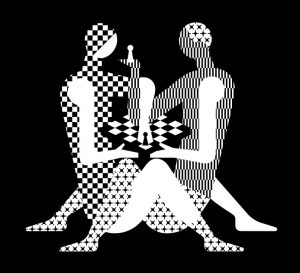 This Friday begins the 2018 World Chess Championship in London. Reigning champion Magnus Carlsen of Norway takes on challenger Fabiano Caruana of the United States in a 12 game series scheduled to conclude November 26th, though tiebreaks could extend the series an extra day or two.
This Friday begins the 2018 World Chess Championship in London. Reigning champion Magnus Carlsen of Norway takes on challenger Fabiano Caruana of the United States in a 12 game series scheduled to conclude November 26th, though tiebreaks could extend the series an extra day or two.
Carlsen, 27 years old, has held the title since defeating Viswanathan Anand of India in 2013. Caruana, 26, trails the current champion by just three rating points going in to the tournament (2835-2832) and is the first American World Champion challenger since Bobby Fischer in 1972.
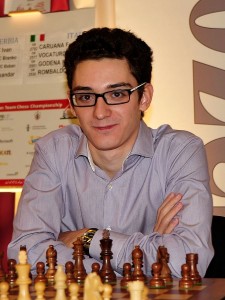 For those not able to attend in-person, the World Championship games will be broadcast live online (3 PM GMT, 10 AM ET). A subscription to the series is only $20.
For those not able to attend in-person, the World Championship games will be broadcast live online (3 PM GMT, 10 AM ET). A subscription to the series is only $20.
Don’t have someone to follow the games with? Consider Mates, the official World Chess Championship dating app. According to the app’s developer, “Good sex has a lot in common with a good game of chess… That’s why Mates limits your conversation to an hour, so you spend less time talking and more time playing.”
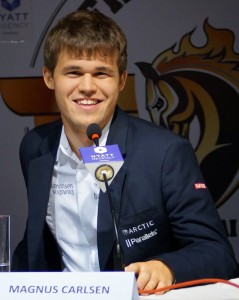 And if that doesn’t work for you, the tournament’s organizers have also signed an official online betting partner. Unibet expects wagers on the Chess championship to exceed those placed on some of the recent FIFA World Cup games. Odds are currently running ⅔-⅓ in favor of Carlsen.
And if that doesn’t work for you, the tournament’s organizers have also signed an official online betting partner. Unibet expects wagers on the Chess championship to exceed those placed on some of the recent FIFA World Cup games. Odds are currently running ⅔-⅓ in favor of Carlsen.
- Comments Off on Carlsen vs. Caruana in the World Chess Championship this Friday
Has your enthusiasm for a game caused you to break out in song?
“Shooter Ready – Keeper Ready – Shoot!” was written and performed by members of the Australian Table Football Association (Subbuteo) as the official theme song for the just-finished Asian Cup.
“Push Em Baby” is the new official theme song for the Montreal Chessbrahs team of the PRO Chess League.
- Comments Off on Board Game Theme Songs
Scoreboard
08 Jan
Posted by David Miller as Card Games, Classic Board Games, Modern Board Games, Other
 Open source Chess engine Stockfish won Chess.com’s Computer Chess Championship, clearly leading the 10-engine, 90-game round-robin and then edging out runner-up Houdini in a superfinal that included 20 rapid, blitz, and bullet games.
Open source Chess engine Stockfish won Chess.com’s Computer Chess Championship, clearly leading the 10-engine, 90-game round-robin and then edging out runner-up Houdini in a superfinal that included 20 rapid, blitz, and bullet games.
Stockfish, though, may be on the way out as grand computer Chess champion. AlphaZero, an algorithm developed by Google’s DeepMind subsidiary, with nothing more than the basic rules to get started, taught itself Chess well enough in 4 hours to beat Stockfish handily over a 100 game series with 28 wins, 72 draws, and zero losses. Though some questions remain about the conditions of the contest, AlphaZero’s play was amazing not only for its performance but also for its style.
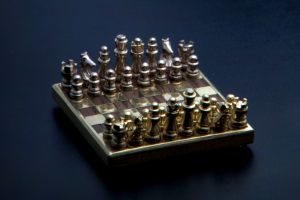 Artist Ara Ghazaryan of Los Angeles has assembled the world’s smallest handmade Chess set with a board measuring 15.3 x 15.3 mm and a king piece standing 4.8 mm tall. Ghazaryan used Brazilian cherry wood, 18 kt. yellow and white gold, and diamonds in building the set.
Artist Ara Ghazaryan of Los Angeles has assembled the world’s smallest handmade Chess set with a board measuring 15.3 x 15.3 mm and a king piece standing 4.8 mm tall. Ghazaryan used Brazilian cherry wood, 18 kt. yellow and white gold, and diamonds in building the set.
The current general World Chess Champion, Magnus Carlsen, won the World Blitz Chess Championship. The previous World Champion, Viswanathan Anand, however, demonstrated that he still retains the competitive spirit, taking home the trophy of the World Rapid Chess Championship.
Kacper Piorun of Poland won the World Chess Solving Championship for the fourth year in a row. The Solving Championship presents competitors with a variety of Chess-game puzzles, such as how to guarantee White a mate in a limited number of moves. There are also helpmate challenges, which require figuring both Black and White-side moves to arrive at mate in a set number of turns, and selfmate challenges, a kind-of suicide puzzle, where the goal is to move White such that it forces Black to mate.
At a Rubik’s Cube event in Chicago, Seung Beom Cho solved the 3×3 puzzle in a world-record 4.59 seconds. At an event in Plano, Texas, Max Hilliard did it blindfolded in 17.87 seconds (also a world record).
Carter Pfeifer Mattig of Chicago won the Merit Open International Backgammon Championship in North Cyprus, taking home a prize of €77,600.
In Sulaymaniyah, in Iraqi Kurdistan, two brothers played Backgammon several thousand feet in the sky, while paragliding.
Eight year-old Zack Barnett, the youngest player ever to do so, won the title of Top Trumps Champion.
There was a Klask World Championship (the first) in Copenhagen. The winner was Kevin Reder of Michigan.
A Pandemic Survival World Championship was held in Amsterdam, where the team of Sébastien Roy and Sébastien MacKenzie Faucher from Canada were declared the winners. Pandemic Survival is a scenario-based version of the game and the tournament rules limit player turns to one minute.
David Eldar of London claimed the top trophy and a £7,000 prize at the World Scrabble Championship in Nottingham, U.K., finishing 3-0 in the best-of-five final series. His last play was the word “carrels”.
Marty Gabriel of Charleston and Scott Garner of Memphis received recognition from Guinness World Records for the highest Scrabble score in 24 hours (two players). Over the course of 240 games (averaging just under 6 minutes per game), the pair scored a total of 216,439 points. As soon as each game was finished, assistants removed the just-played board for documentation and provided the pair a new board already set up for play.
A team in Michigan toppled 245,732 dominoes in a setup that paid homage to various board games. The project also broke the U.S. domino records: largest domino field, largest domino structure, and largest overall domino project.
In Germany, Sinners Domino Entertainment broke the world record for most dominoes toppled underwater, 11,466.
- Comments Off on Scoreboard
Board Game Epilepsy
29 Sep
Posted by David Miller as Card Games, Classic Board Games, Modern Board Games
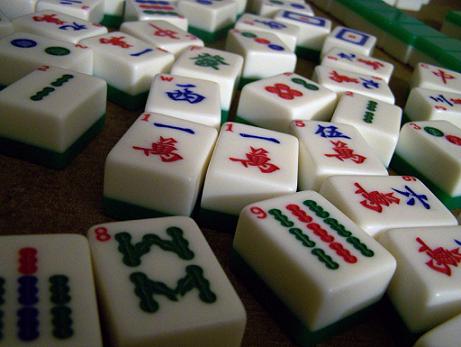 Imagine that your favorite board game made you sick. I mean, convulsing on the floor, eyes rolling back, foaming at the mouth sick! That’s what recently happened to a 52 year old Chinese man while playing Mahjong. Still, who would have imagined a tabletop game causing seizures. But after a second incident mid-game, doctors with the Zhejiang University School of Medicine diagnosed Mahjong epilepsy.
Imagine that your favorite board game made you sick. I mean, convulsing on the floor, eyes rolling back, foaming at the mouth sick! That’s what recently happened to a 52 year old Chinese man while playing Mahjong. Still, who would have imagined a tabletop game causing seizures. But after a second incident mid-game, doctors with the Zhejiang University School of Medicine diagnosed Mahjong epilepsy.
Mahjong epilepsy is a rare reflex epilepsy syndrome, a type of condition in which seizures can be brought on by certain stimuli, such as flashing lights. Mahjong epilepsy most closely resembles a cognition epilepsy subtype, in which seizures are induced by decision-making, spacial tasks, and other thought processes. There have been cases of seizures induced by writing, drawing, and performing mathematical calculations.
In a 2007 study of 23 cases, doctors in Hong Kong, however, found Mahjong epilepsy sufficiently distinctive, noted that both playing and just watching Mahjong could lead to seizures, and ruled out stress or sleep deprivation as the cause. In the recent Chinese case, the man’s doctor hypothesized that a possible trigger could have been the patterns of circles and dots found on Mahjong tiles.
Other cases of game-induced seizures have been confirmed by medical professionals. A 1965 article in the Chinese Medical Journal documented four patients with repeated epileptic seizures playing and watching games of Chess and cards. Among these cases, the sufferers would find themselves uncontrollably gesturing with their arms, standing and spinning, and losing consciousness.
Case studies in the journal Epilepsia report on an Italian man who over a period of years suffered “arrests of thought” when playing cards or Draughts, three Asian patients for whom cards and Draughts induced tonic-clonic seizures, and an American woman who experienced generalized seizures when playing Checkers.
See also the Journal of Neurology, Neurosurgery, and Psychiatry for a report on a patient who’s jerking motions and loss of consciousness were evoked by attempts to solve a Rubik’s Cube; Neurology for a study of 25 cases involving “activation of seizures by calculation, card, and board games“; and the Journal of Clinical Neurology (Korea) for information on 13 patients who experienced seizures while playing the card game Go-Stop and four patients who’s seizures were triggered by playing Baduk (Go).
- Comments Off on Board Game Epilepsy
 Taking home the trophy and a $10,000 prize at the North American School Scrabble Championship was the team of eighth-grader Jem Burch and seventh-grader Zach Ansell, both of Los Angeles. Their final round score was 374-349 on such words as eugenia, infares, entresol, and steeping.
Taking home the trophy and a $10,000 prize at the North American School Scrabble Championship was the team of eighth-grader Jem Burch and seventh-grader Zach Ansell, both of Los Angeles. Their final round score was 374-349 on such words as eugenia, infares, entresol, and steeping.
At the Xi’an Cherry Blossom tournament in China, Kaijun Lin solved a 5×5 Rubik’s Cube in a world record 4 minutes, 11.93 seconds. Then 2 weeks later, he broke his own record, solving the 5×5 in 4 minutes, 10.00 seconds.
Fourth-dan Sota Fujii, the youngest ever professional Shogi player, has extended his winning streak to 16 matches.
The final round of the Women’s World Chess Championship saw Anna Muzychuk (Ukraine, GM, 2558) and Tan Zhongyi (China, WGM, 2502) tied 2-2 after four games of classic time controls, and still even after the first rapid tie-break game. Zhongyi, though, won the second and the World Champion title.
Wesley So, now the world’s number 2 ranked Chess player, came in first at the U.S. National Championship but only after facing down Alex Onischuk 1½-½ in a rapid playoff round. In the women’s section, sixth seed Sabina-Francesca Foisor was the winner with an 8-3 score, one point ahead of the 2016 champion.
The German Bundesliga professional Chess league has finished its season with the Baden-Baden team reclaiming the title it had lost last year after 10 previous consecutive wins. In the 4NCL English professional league, team Guilford won for the fifth year in a row.
Keegan “Kelian-05” Tailleur was the winner of the 9th Memoir ’44 French Open, a 2 day tournament with special scenarios based on tanks.
A new world record has been set for most dominoes toppled in a single line: 15,524.
- Comments Off on Scoreboard
 A team from Slovenia won the Red Bull Mind Gamers’ first Escape Room World Championship, which featured some really high-end set design (including a rotating tunnel) and challenges themed around quantum computing. The escape-rooms were designed by Prof. Scott Nicholson and his students at Wilfrid Laurier University. Held this past week in Budapest, the event ran more than 20 international teams through a series of timed challenges, with the top two teams, Slovenia and Ukraine, moving to the finals. There, the teams’ performance on a series of additional challenges—including one that surprised the competitors by needing to be solved cooperatively—determined the difficulty level assigned to them in a final puzzle.
A team from Slovenia won the Red Bull Mind Gamers’ first Escape Room World Championship, which featured some really high-end set design (including a rotating tunnel) and challenges themed around quantum computing. The escape-rooms were designed by Prof. Scott Nicholson and his students at Wilfrid Laurier University. Held this past week in Budapest, the event ran more than 20 international teams through a series of timed challenges, with the top two teams, Slovenia and Ukraine, moving to the finals. There, the teams’ performance on a series of additional challenges—including one that surprised the competitors by needing to be solved cooperatively—determined the difficulty level assigned to them in a final puzzle.

The inaugural season of the PRO Chess League has concluded with the St. Louis Arch Bishops taking the championship title. St. Louis, led by the world’s number 2-ranked player Wesley So, faced in the final match the Norway Gnomes, led by number 1, World Chess Champion Magnus Carlsen. So also captured the medal for MVP.
Also hailing from St. Louis, the Webster University Chess team won its fifth consecutive President’s Cup Collegiate Chess Tournament in New York City (fondly known as the Chess Final Four). Coach Susan Polgar was quoted as saying, “This was an incredibly hard victory, and the students gave everything they had. The competition on Saturday lasted nearly 13 hours, underscoring the importance of both physical and mental toughness.”
At the Cubing Classic in Melbourne, Australia, Feliks Zemdegs solved a 7×7 Rubik’s Cube in a world record 2 minutes, 18.13 seconds.
A Michigan team by the name of Incredible Science Machine has broken the world record for number of dominoes (76,017) toppled from the center in a circle field. The circle was the final display in a longer domino-toppling series that started with a Rube Goldberg-type trigger and included separate sections dedicated to each of Earth’s continents.
Turmoil at the Top of the World Chess Federation
28 Mar
Posted by David Miller as Classic Board Games
 Is Kirsan Ilyumzhinov on his way out as president of FIDE (the World Chess Federation)? According to the organization’s website, he resigned Sunday at FIDE’s board meeting in Athens. But this man who consorts with dictators, claims to have been abducted by aliens, believes that aliens are the source of Chess on Earth, and is the subject of sanctions by the U.S. government for providing support to the Assad regime in Syria claims such assertions are false.
Is Kirsan Ilyumzhinov on his way out as president of FIDE (the World Chess Federation)? According to the organization’s website, he resigned Sunday at FIDE’s board meeting in Athens. But this man who consorts with dictators, claims to have been abducted by aliens, believes that aliens are the source of Chess on Earth, and is the subject of sanctions by the U.S. government for providing support to the Assad regime in Syria claims such assertions are false.
Ilyumzhinov does admit that he offered—unofficially, in discussions after the close of the meeting—to submit his resignation if necessary but has also since published an open letter to FIDE’s board stating that he never did resign, nor does he intend to.
Many would not be sad to see him go. There have been longstanding accusations of corruption. Nor has he actually been in charge of FIDE’s day-to-day operations recently, having stepped out of that role since the imposition of the sanctions. Still, Ilyumzhinov did soundly defeat democracy activist and former World Chess Champion Garry Kasparov in the last election for the FIDE presidency (an accomplishment commonly believed to have been achieved with the support of Russia’s President Putin). And the idea that he has lost the support of the national federations would come as a shocker.
FIDE’s Executive Director Nigel Freeman states that an Extraordinary Presidential Board meeting will take place April 10th to discuss the situation. But don’t expect this situation to remain calm until then!
- Comments Off on Turmoil at the Top of the World Chess Federation
Dungeons & Dragons VR Chess
03 Mar
Posted by David Miller as Classic Board Games, Electronic Games, RPGs
Experiment 7 is develop, with license from Wizards of the Coast, a Dungeons & Dragons-themed virtual-reality Chess game. Dungeon Chess (for Samsung Gear VR and Oculus Rift) will feature animated game-play, a variety of environments (like the Yawning Portal tavern), and iconic D&D monsters as Chess pieces (e.g, dragons as kings, beholders as rooks, drow as pawns, and mind-flayers as bishops).
Remote multiplayer and AI opponents will be available.
Release of Dungeon Chess is planned for later this year.
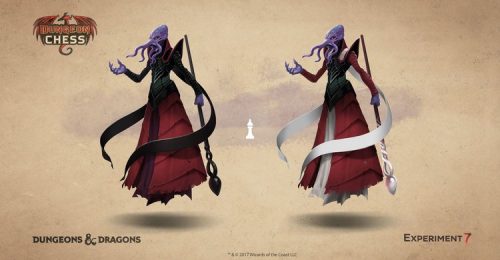
Trending
- Massdrop.com
- Oh the Irony—Illuminati Card Game Continues to Inspire Conspiracy Theorists
- Footprints, an Educational Ecology Game
- USPS Adds Board Game Flat Rate Box
- Home
- Baila, the Estonian Drinking Card Game
- Crystal Caste Wins Dice Patent Suit Against Hasbro
- Hasbro and Mattel Merger?
- Are Board Games Dangerous?
- Board Games Based on Hindu Mythology
Archives
Most Popular Articles
- Oh the Irony—Illuminati Card Game Continues to Inspire Conspiracy Theorists
- The 20 Most Valuable Vintage Board Games
- The Truth About Dominoes On Sunday in Alabama
- Sequence Game, and Variants
- USPS Adds Board Game Flat Rate Box
- Baila, the Estonian Drinking Card Game
- The 13 Most Popular Dice Games
- Are Board Games Dangerous?
- Guess Who? The Naked Version
- What Happened to the Jewel Royale Chess Set?
Recent Posts
- Toy Fair 2019—Breaking Games
- Talisman Kingdom Hearts Edition
- Toy Fair 2019—Winning Moves
- Toy Fair 2019—Games Workshop
- Toy Fair 2019—Star Wars Lightsaber Academy
- Toy Fair 2019—Stranger Things Games
- Toy Fair 2019—HABA
- Licensing Roundup
- Game Bandit
- 2018 A Difficult Year For Hasbro But Not For D&D Or MtG
Recent Comments
- on Toy Fair 2019—Winning Moves
- on Game Bandit
- on Second Look—Dungeons & Dragons Waterdeep Dragon Heist
- on Crowdfunding Highlights
- on Beyblade SlingShock
- on Game Bandit
- on Game Bandit
- on Watch This Game!, the Board Game Review Board Game
- on Second Look—Vampire: The Masquerade 5th Edition
- on Palladium Books Loses Robotech IP License, Cancels Five-Year-Overdue Robotech RPG Tactics Kickstarter




